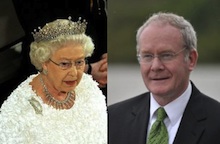
The North’s Deputy First Minister Martin McGuinness has given the strongest indication yet that he is prepared to meet British monarch Queen Elizabeth, who is expected to travel to the north of Ireland this summer.
Mr McGuinness said republicans need to “consider making new compromises” when he addressed an international conference to mark the ‘success’ of the Irish peace process in Dublin this week.
Reconciliation between the republican community and the British state would not be easy but it was essential, he added.
“Republicans inflicted much hurt during the conflict, and hurt was inflicted upon republicans, but if we are to build a new future it is necessary and it is a road that I am not afraid to go down,” he said.
Asked by reporters if he would meet the queen, Mr McGuinness did not answer directly, but said ‘progress’ had been made in the Six Counties because politicians had been prepared to compromise.
“Compromise for me in our peace process is not a dirty word. Big challenges will lie ahead for all of us. Am I big enough to rise to challenges? Absolutely.”
During the queen’s visit to the 26 Counties last May, Sinn Féin did not take part in the associated ceremonies and Mr McGuinness declined an invitation to attend the Dublin Castle function.
The North’s First Minister Peter Robinson told reporters that it would soon become the norm for Sinn Féin leaders in the North to greet British monarchs.
“I think it would be a step that should be taken. Many years ago of course I made the gesture of meeting the head of State here in the Irish Republic,” said Mr Robinson.
“And I think you’ll find that if he meets Her Majesty it will become a norm and meeting members of the royal family will become part of the everyday fabric of political life.”
NIO OUT?
Speaking at a subsequent event in London on Monday, Mr McGuinness adopted a more traditional nationalist stance, calling for an end to British Direct Rule.
Despite the transfer of many government powers from London to Belfast, Britain’s Northern Ireland Office and Secretary of State [Direct Ruler] Owen Paterson remain in control of key areas of government in the Six Counties, such as overall taxation and spending levels, as well as security and military functions.
During a lecture at the London School of Economics, Mr McGuinness argued that just as the 1916 Rising marked the end of the British empire, the Good Friday Agreement of 1998 marked the end of the British union.
“The role of the British secretary of state continues to diminish, and rightly so, in my view,” Mr McGuinness said.
“It is time for a serious conversation on whether there is a need for the NIO and the secretary of state job to exist at all.”
He urged people in Britain to lobby for a change in British government policy on the union.
“It is my view that the removal of the NIO and the secretary of state position and the transfer of remaining powers would be a massive vote of confidence in our political institutions and the peace process, as well as a massive saving to the [British] exchequer,” he added.
Mr McGuinness’s comments come amid a deteriorating relationship between Sinn Féin and the Direct Ruler.
The party has criticised Mr Paterson for saying he had “no intention” of running a border poll on a united Ireland and blamed him for theBritish government’s decision not to have a public inquiryinto the 1989 killing of defence lawyer Pat Finucane.
Mr Paterson has also been dismissive of the Stormont administration, saying last week that it needed to “deliver” and move beyond the politics of the peace process.
“Otherwise the danger for all of us is that it begins to lose public credibility, which itself could be a source of instability,” he said.
The DUP’s Jeffrey Donaldson described Mr McGuinness’s calls as “nonsensical”.
“Such fanciful political proposals by Sinn Féin are not useful and only serve to cause division,” he said.
“This proposal has not originated with the intention of improving government but rather is an attempt to pushan anti-unionist, pro-united Ireland message.
“It is hardly surprising that at a time when Catholic support for the union is at anall-time high Sinn Féin are attempting to divert attention from the fact that their united Ireland strategy is in tatters.”
![[Irish Republican News]](https://republican-news.org/graphics/title_gifs/rn.gif)
![[Irish Republican News]](https://republican-news.org/graphics/title_gifs/harp.gif)

